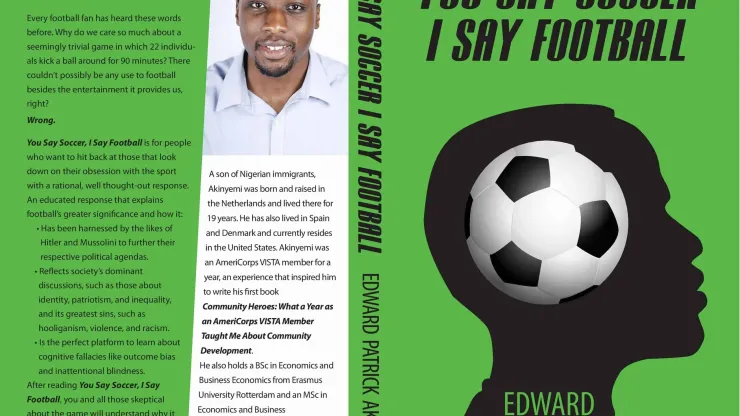When was the last time a soccer book began with a quote from the Pope?
One of the newest and best genres of sports writing is how sports intersects with society. Going beyond the bounds of a game’s rules and tactics, this genre shows (and in many ways justifies) our passion for a sport. If soccer can help you better understand social injustice or ties into the meaning of the greater good, then that justifies watching multiple matches for hours on a 70 degree weekend with yard work, significant others, and kids demanding attention.
Edward Akinyemi, a longtime soccer writer, decided to take this approach with his second book, You Say Soccer, I Say Football. The book delves into a number of timely topics and how soccer better shapes our understanding of them. He begins with understanding an individual, exploring how topics like outcome bias can be understood in our daily life through the beautiful game. For example, we often think of “playing out of the back” as a riskier strategy versus clearing the ball, but statistics show an emotional bias on outcomes misleads us, as happens often in life.
After touching on team dynamics and the oversized role of the manager, Akinyemi delves into societal topics. For many soccer fans, the topics generally are familiar with details that may be surprising to newer fans. Here he draws a tight line between the societal issues of racism, discrimination, autocracy, and brutality on and off the pitch. The final section touches on more philosophical topics that could be considered separately from the others.
The most impressive thing about this book is the wide variety of sources used in the discussions. Akinyemi not only uses Michael Cox and Steven Goff material, but books written by Navy Seals and Nobel laureates in economics. He seamlessly weaves together academic and pop culture sources into the soccer sources to illustrate why soccer concepts appeal to a wider discussion, and vice versa. A perfect example is the chapter on fairness. When discussing why teams on the back foot sometimes walk away with the full three points and it seems unfair, Akinyemi cites, among other sources, a speech by Chief Justice John Roberts and a book by Navy Seals discussing intentional cheating during training. It is these kinds of connections that will thrill soccer fans that like to take a wider view of the game.
READ MORE: The ultimate guide to the best soccer books
This book is relatively short and a fast read, and it is apparent the author poured a lot of passion into his writing. The majority of the book is an engaging read, with the only real lag coming in the final section. At times, the writing deviates too much from soccer to be as well written as the rest, but it is still not bad. You Say Soccer is a nice gift for a soccer fan with wider interests. It may not wow them with facts like a Soccernomics, but it deserves a spot on the shelf among your soccer books you’ll loan out (and require the person to return).
You Say Soccer, I Say Football is available via Amazon as well as directly via the author’s website.
200+ Channels With Sports & News
- Starting price: $33/mo. for fubo Latino Package
- Watch Premier League, Women’s World Cup, Euro 2024 & Gold Cup
The New Home of MLS
- Price: $14.99/mo. for MLS Season Pass
- Watch every MLS game including playoffs & Leagues Cup
Many Sports & ESPN Originals
- Price: $10.99/mo. (or get ESPN+, Hulu & Disney+ for $14.99/mo.)
- Features Bundesliga, LaLiga, Championship, & FA Cup
2,000+ soccer games per year
- Price: $5.99/mo
- Features Champions League, Serie A, Europa League & Brasileirāo
175 Premier League Games & PL TV
- Starting price: $5.99/mo. for Peacock Premium
- Watch 175 exclusive EPL games per season






